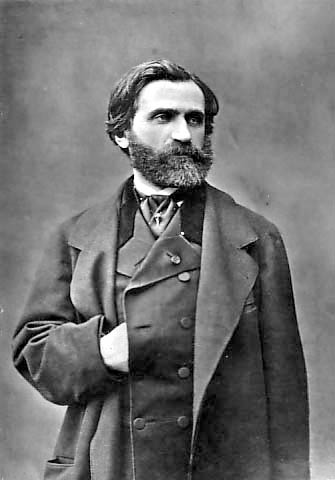FGO to mark Verdi’s bicentennial with “Nabucco”
It’s almost impossible to imagine the world of opera without the music of Giuseppe Verdi, especially this season with opera companies around the world celebrating the bicentennial of his birth. With their intense dramatic sweep, innate lyricism and unforgettable characters, from the tragic Violetta of La traviata to the comic Sir John Falstaff, Verdi’s operas are perennial audience favorites.
Verdi was exceptionally prolific, writing a total of 26 operas, more than half of them between 1843 and 1853 in what he called his “galley years” (as in galley slave). But at crucial points in his career—very early, in 1841, just before composing Nabucco, and very late, in the period before he took up Shakespeare’s Othello in 1879—he had all but stopped composing for the opera stage.
Florida Grand Opera opens its production of Nabucco January 25 at the Adrienne Arsht Center in Miami, offering Florida audiences a chance to see what is generally considered Verdi’s first mature work. The opera includes “Va, pensiero,” the haunting chorus that contains one of Verdi’s best-known tunes.
When Verdi went on hiatus before Otello, the reasons were happy ones. He was in his late 60s, his place in musical history assured. He wanted to enjoy his leisure on his large country estate. His publisher thought otherwise, however, and used Verdi’s life-long devotion to Shakespeare to lure him back to the opera house.
With Nabucco nearly four decades earlier, Verdi’s turn away from opera had much more painful roots. His first opera, Oberto, Conte di San Bonifacio, was a success at Milan’s La Scala in November 1839. But 10 months later, his second opera, a comedy titled Un giorno di regno, was a resounding failure.
At the same time, Verdi’s personal life had collapsed around him. Between August 1838 and June 1840, his 17-month-old daughter, 14-month-old son and 27-year-old wife all died. As one historian put it, “Verdi…proceeded icily but steadily to write [Un giorno di regno] and proceeded just as steadily along the road to nervous collapse.’’ He was in his late 20s, and he vowed that his life in music was over.
Luckily, he was wrong. Using a mix of kindness and exasperation, Bartolomeo Merelli, director of La Scala, refused to let Verdi go. Merelli persuaded him to look at a libretto he had on hand about the oppression of the Israelites under the Babylonian emperor Nebuchadnezzar.
Verdi may have embellished the facts four decades later when he recalled his first reaction to the libretto. But there’s no doubt it made a strong impression.
“When I got home I threw the manuscript on the table with a violent gesture, and stood staring at it. It had fallen open, and ….I read the line, “Va, pensiero, sull’ali dorate (Hasten, thoughts, on golden wings)”…I glanced through the following verses and was deeply moved…[R]esolute in my determination never to compose again, I forced myself to close the book and go to bed. But Nabucco kept running through my mind, and I couldn’t sleep.”
The opera was an immediate success at its premiere in March 1842. “Va, pensiero” became the first of Verdi’s numerous popular hits and an anthem for Italians fighting for a unified Italy free from foreign control.
“There’s a major change in his maturity,” said Ramon Tebar, Florida Grand Opera’s music director who is conducting the company’s first production of Nabucco since 1981. “It was a big stretch toward his own style.
“There is some influence still of composers like Rossini, but in this work we already see the Verdi of Otello, of Traviata, of Rigoletto. There’s the use of the baritone as the protagonist rather than the tenor. The other element is the use of the chorus, the people as a driving force, another character. This is one of the genius achievements of Verdi.”
The plot also points toward later Verdi operas. As in Aida, there is a tragic love triangle involving political foes. Abigaille, allegedly Nabucco’s daughter but actually the daughter of one of his slaves, is in love with Ismaele, the King of Jerusalem’s nephew. She vows revenge when she discovers that Ismaele prefers Fenema, Nabucco’s legitimate daughter.
The cast includes several artists making their FGO debuts. Among them are the distinguished Russian soprano Maria Guleghina who sings Abigaille Jan. 25, 28 and 31 and Susan Neves who takes the role in remaining performances. Dario Solari and Nelson Martinez alternate as Nabucco, and Kevin Short appears as the Israelite high priest Zaccaria.
Guleghina sang her first Abigaille in 1996 in Bari, Italy, and it has become one of her signature roles. Verdi’s soprano roles are typically demanding, but Abigaille is considered one of his most daunting.
“It was a really fantastic production,” Guleghina said of her first performances of Nabucco, “and it was really, really hard work. It’s very difficult emotionally. But to give all that emotion, you have to have all the vocal possibilities in hand. And to prepare for all those vocal possibilities is very hard. You need a strong voice, with a little color like a mezzo-soprano.”
Guleghina says she keeps discovering new depths to Abigaille’s lust for power and revenge.
“I love this role,” she said. “She wants to be the real daughter of Nabucco, but she’s the daughter of his slave. When she gets the throne, she isn’t satisfied. She’s empty inside. Nothing is more important to her than love and family.”
Solari also enjoys Verdi’s requirement that singers must also be gifted actors.
“I started singing Verdi young, when I was 26,” said the baritone who was born in Uruguay. “Nabucco is a very strong role, very dramatic. It’s very challenging for the singer as an actor. Nabucco has so much power and you have to show that. Also, it’s very well written. It fits me vocally. In Nabucco we’re very close to bel canto”
“Verdi, he’s my favorite,” said Guleghina. “All my life I’ve sung a lot of Verdi—eighteen of his operas. Everything is very heroic, very clear ideas—for love, for honesty, for country. It’s really something very good and important.”
Nabucco opens 7 p.m. January 25 at the Adrienne Arsht Center and runs in Miami through February 1, moving to the Broward Center in Fort Lauderdale Feb. 6 and 8. fgo.org.
Posted in Articles
Leave a Comment
Fri Jan 17, 2014
at 2:28 pm
No Comments


